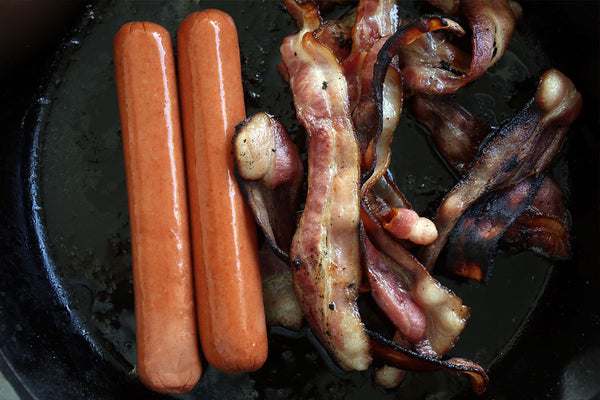Bloating is a sensation of feeling overly stuffed or full, and it’s most commonly caused by excessive gas production in the body (though other factors can contribute to bloating, including dehydration).
Bloating is something we’ve all dealt with at one time or another, and while it’s not the sexiest topic of conversation, inevitably you’ll wonder what causes bloating and how can you prevent bloating? Believe it or not, the foods you eat have the most acute/direct impact. Here, we discuss the 5 worst foods for bloating, beginning with…
Worst Foods for Bloating
Cruciferous Vegetables
You’ve been told countless times how important it is to “eat your veggies.” And, when you’re settling down to a choice dinner of grilled steak, chicken or fish, there’s usually a side of vegetables.
Veggies taste great, are full of fiber, and loaded with powerful phytonutrients that support total body health. However, certain vegetables can cause certain individuals to experience GI distress, gassiness, and bloating. Cruciferous vegetables, such as kale, broccoli, cabbage, cauliflower and Brussels sprouts, are notorious for causing bloating due to their raffinose content. Raffinose is a complex carbohydrate that is fermented by gut bacteria, resulting in increased gas production. The reason for this, in part, is that our bodies do not contain the enzyme required to digest raffinose, but our gut bacteria can ferment it, which helps to keep them happy and healthy.
It may help to take a digestive enzyme complex and/or reduce the quantity of cruciferous vegetables you eat during a given meal.
Frozen Dinners
Time is at a premium, and there are more demands of our time than ever before. This has led to more and more individuals relying on meal delivery services, fast-food, and frozen TV dinners. While these options offer a quick/hot meal -- they also are typically chock full of carbohydrates and sodium -- both of which consumed in high amounts can lead to bloating.
The combination of high amounts of carbs and sodium causes your body to retain extra water, which can lead to bloating and a distended belly.
Bacon, Sausage & Other Processed Meats
Bacon, sausage, pepperoni and most other processed/preserved meats are very tasty…and they’re also high in sodium (as well as saturated fat). This combination slows digestion and causes water retention.
While these foods are OK in moderation (read: small amounts), consuming high amounts of them regularly will likely cause bloating. Pairing them with a fermented vegetable, such as sauerkraut or kimchi, may help to reduce bloating and improve digestion, due to their probiotics content. But, you’re better served by preparing your own proteins (chicken, steak, fish, shrimp, etc.) where you can regulate the salt and fat content.
Chili
On a chilly day, there’s nothing quite as comforting as a bowl of warm chili. The hearty stew is rich in protein, fiber, vitamins, and minerals. However, depending on how you make your chili (beans/no beans, what grind of beef you’re using, etc.), the cold weather staple can also lead to serious GI distress and bloating. Beans contain a type of oligosaccharide that cannot be digested, but it is fermented by the bacteria in our gut -- which helps to keep them healthy and strong, but may also lead to bloating in some individuals.
Dairy
Dairy is a rich source of calcium and high-quality protein (including whey protein and casein protein). However, whole dairy sources, such as milk contain lactose which can lead to bloating and GI distress for some individuals. Consuming digestive enzymes that include lactase can help to combat bloating. Another option to try if you want to enjoy the muscle building and recovery benefits of whey protein, without the GI distress, is to use whey protein isolate, which essentially has all the dairy fat and lactose removed while retaining the high-quality protein and rich calcium content.
How to Stop Bloating
Choose the Right Foods
Beating belly bloating begins with understanding your body and selecting foods that agree with your digestive system. Foods that agree with you might not agree with your significant other or friends, and vice versa. If you find that a particular food causes bloating, try removing it from your diet for a week or two and see if that improves your digestion.
Don’t Overeat
In addition to choosing the right foods, another key step to avoiding GI distress is to be mindful of how much total food you’re consuming at any given time. Even “healthy” foods when consumed in excess can lead to a distended belly and bloating. Tracking your calories can help you stay on track with your goals and avoid overeating. The 1UP Fitness App makes it quick and easy to track your daily nutrition goals, and if you’re not sure where to begin, we provide customized nutrition and training based on your preferences and goals.
Exercise Regularly
Physical activity can help release trapped gas in the body and reduce gas pain. Going for a 10-15 minute walk after eating is a great way to promote healthy digestion and avoid bloating. As an added bonus, it can also help increase daily energy expenditure, improve insulin sensitivity, and keep you on track with your fitness and physique goals.
Consider Probiotics
Probiotics are good gut bacteria that can support gut health and reduce feelings of bloating. 1UP Gut Health Plus and Vegan Greens & Reds Superfoods Plus both provide quality doses of stable probiotics as well as other gut health supplements to nourish your microbiome and support digestive function.






